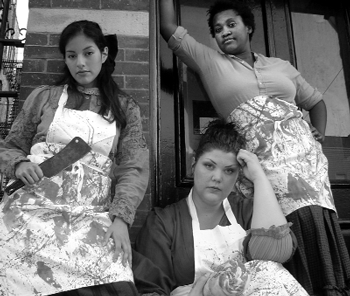Female butchers buck social constraints in Edwardian London
For the women who work the slaughterhouses of late 19th century London, the stench of rotting carcasses and offal is the smell of money. Financial independence from a man is the ability to live as one wants, to keep the bawdy jokes flying, with nothing to think about but “buying a new hat, or being the queen of England” as one of the characters in the Sarah Daniels play “The Gut Girls” tells a new hire.
The five women characters are unfazed by pools of blood and piles of entrails, but as this historical drama unfolds, we see how their financial independence, free will and spirit are whittled away by social ideals of femininity.
These abattoir employees are social outcasts, the oft-repeated sentiment being, “there’s only one thing worse than being a gut girl; that’s being a whore.” But their choice of profession allows them a freedom unusual for women of the time; as they tell a maid: “We are paid more in one week than you make in a year.” In fact, steadfast Maggie, hardworking Polly, crusading Ellen, flighty Kate and young Annie are doing fine with their lot in life—that is, until interloping do-gooder Lady Helena stops by the slaughterhouse, intent on recruiting the gut girls for a ladies club.
“Your well-being is my concern,” says Lady Helena, to which lightening-fast Maggie replies, “Life is for the livers.” Chagrined, Lady Helena turns for solace to Polly, who quips, “They got no morals; what they got is offal,” a double entendre which does not register with Lady Helena until well into the next act.
But the “gut girls” are less than eager to spend their few free hours after work having coffee and cake, more inclined to trade the chops they’ve smuggled out under their frocks for beers at the local bar—even if they do have to fend off advances from the barkeep. That soon ends after Lady Helena brokers a deal with slaughterhouse owner, Mr. Cuttlesmith, who permits the women to leave work an hour early once a week to attend the club, giving his own withdrawn, and domestically abused, wife Priscilla over to Lady Helena as a helpmate.
As the upper-class doyenne stops at the end of scene three to pray for the gut girls, audience members and characters alike begin to wonder why Lady Helena cares so much. And even though they have to burn the furniture to keep warm at Polly’s house, her sister’s disdain proves prescient as she foreshadows the disaster to come saying, “Mark my words, they always end up making things worse.”
Lady Helena does indeed make things worse. Polly, Annie and even saucy Kate learn how to sew and how to carry a tray and how to “take small steps” and “not speak until spoken to.” Ellen, always outspoken about worker’s rights, women’s rights and cruelty against animals, finds herself reassigned to the loading deck, and Maggie soon drops out of the classy ladies club after Lady Helena’s ill-matched suitor Lord Tartington brutishly tries to rape her. Luckily, Maggie’s knife is bigger than his.
The advent of refrigeration causes the slaughterhouse jobs to dry up and Lady Helena has many of the girls primed to be housemaids—a job more socially acceptable, but one that pays much less and has strict codes of behavior attached to it.
Polly ends up a housemaid to abusive Mr. Cuttlesmith, who finds when he tries to bludgeon her with a coal iron that years of lifting sides of beef have given her a hell of a cross punch. Annie, who was originally a housemaid until the master’s son raped her, finds herself back in her maid’s hat and apron, dreaming of the day when she can be free. Though she shares another girl’s sentiment about not returning to a life “bowin’ and scrapin,” she eventually concedes, “I’ve been on the streets before, and anything is better than that.”
Kate takes to domesticity like a fish to water, even shunning her co-workers for fear that being seen with them will hurt her chances of being a chambermaid—or better yet, a nanny. The plans she and her beau shared of opening a toy store are quickly cast aside, as though they never existed. Maggie, unemployed and unemployable, thrown out by her mother, is forced to marry the flirtatious bartender, and Ellen finds it difficult even to hold onto a job in the button factory.
Yet Lady Helena looks back on her work with a satisfied smile. We finally discover that her impetus for helping the gut girls is not just about philanthropy. Ironically, Helena seeks to break out of confines of domesticity by pressing the gut girls into it. The action should end here, with the woman scattered across the stage, á la the French film “Eight Women.” Yet it mercilessly continues for ten more scenes, drawing the women’s fate out to its natural, awful conclusion. Even the formerly unflappable Maggie sadly states, “I wanted something more for myself, but I guess my mom was right.”
The only ray of hope is Ellen’s closing statement that it is one’s right and responsibility to speak out against injustice, rather than just “sit there and let it happen again.” The play says much about the growing class-consciousness in England as the Industrial Revolution gained steam.
The company makes the most of its small cube of space, setting the risers to the far wall of this small theatre—a former chocolate factory—and having the action unfold in front. Though the theater seats only 35, this ensures that none will sneak out early, as the exit is in the middle of the stage. As the show rounded into its third hour, however, I began to curse this logistical nightmare. Though the play was well directed, despite a panoply of awful English accents, it was not strong enough to support its length. If you are going to aspire to stage a show with a Broadway run time, it must have the pacing to keep up. Not to mention that the tiny theater did not have air-conditioning, a fact that would have been devastating if not for the plethora of fans directed toward the audience. The actors, clad in heavy costumes with bustles and petticoats, had my sympathies.
Still, the set work was nice, and the acting up to par. Having the ladies work a mock-up of a side of beef in the first act, pulling out livers, hearts and entrails, kept the women’s hands moving and the action much more natural. Flying Fig Theater is definitely on to something with this ambitious staging, which, given a few tweaks and less humid weather, could prove to be a success.
gaycitynews.com



































